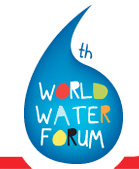World Water Week brought together stakeholders to promote reinforcement of capacities, the establishment of partnerships, and follow up on international processes and programmes concerning water and development.
 31 August 2012: World Water Week, organized by the Stockholm International Water Institute, convened from 26-31 August in Stockholm, Sweden, under the theme of “Water and Food Security.” World Water Week brought together stakeholders to promote reinforcement of capacities, the establishment of partnerships, and follow up on international processes and programmes concerning water and development.
31 August 2012: World Water Week, organized by the Stockholm International Water Institute, convened from 26-31 August in Stockholm, Sweden, under the theme of “Water and Food Security.” World Water Week brought together stakeholders to promote reinforcement of capacities, the establishment of partnerships, and follow up on international processes and programmes concerning water and development.
In her World Water Week address, Lakshmi Puri, UN Women, underscored the need to: recognize women as water resource managers, farmers and irrigators in laws, policies and through social awareness programmes in communities; increase efficiency in managing food and water resources, ensuring that women are empowered along the water and food supply chain; address the multifaceted gender discrimination in accessing and controlling productive resources such as water and land, assets and services; and leverage the voice, participation and influence of women in managing the sustainable use of water resources and food, and sharing benefits equally. Puri also underscored that a Sustainable Development Goal on water should prioritize women’s full participation in water governance, the alleviation of their work burden and the availability of gender sensitive infrastructures and services.
The UN Children’s Fund (UNICEF) stressed the most important step in providing universal access is to address the inequities which exist in all regions and at all levels and where the poorest and women are most affected.
European Union (EU) Commissioner for Development, Andris Piebalgs, drew attention to the EU Millennium Development Goal (MDG) initiative, which is allocating an extra €1 billion for African, Caribbean and Pacific countries to meet the most off-track MDGs, noting that the water and sanitation MDG is specifically targeted by the initiative. The European Commission (EC) underscored the increasing water-related challenges and their linkage with climate change, noting the EC has completed an in depth review of EU water policy and be making several policy proposals in its strategic document titled the “Blueprint to Safeguard Europe’s Water Resources.”
The International Water Management Institute (IWMI) stressed the need to sustainably intensify agriculture, in an era of rapid economic growth and climate change, to avert global resource crisis. IWMI highlighted the need to improve irrigation efficiency and water productivity, by building resilience through increased water storage, and also the potential of recycling and reuse of wastewater and sewerage.
The World Water Council (WWC) and the Republic of Korea updated delegates on their Water and Green Growth programme, under which the WWC explained water was viewed as a “motor” for development.
The Asian Development Bank announced the forthcoming publication titled “Asian Water Development Outlook 2012,” which it said will quantify the status of water security in all Asia-Pacific economies, and provide recommendations about the policy levers Asia’s leaders can use to increase water security. [World Water Week Website] [UN Women Press Release] [International Fund for Agriculture and Development Press Release] [EC Press Release, 27 August] [EC Press Release, 24 August] [ADB Press Release] [UNICEF Press Release] [IWMI Press Release] [WWC Press Release]